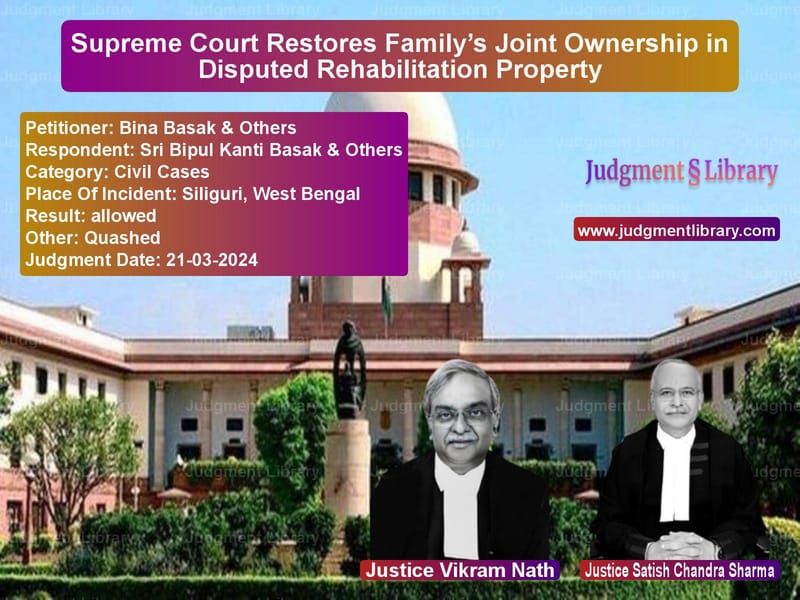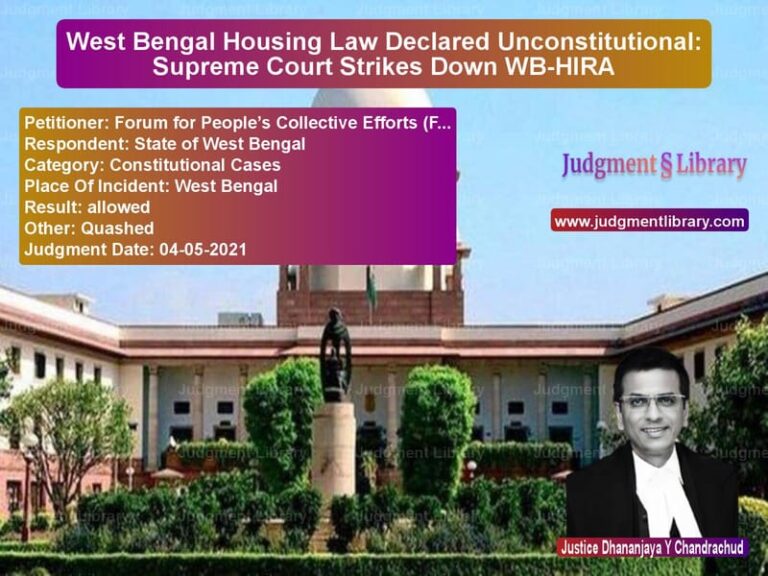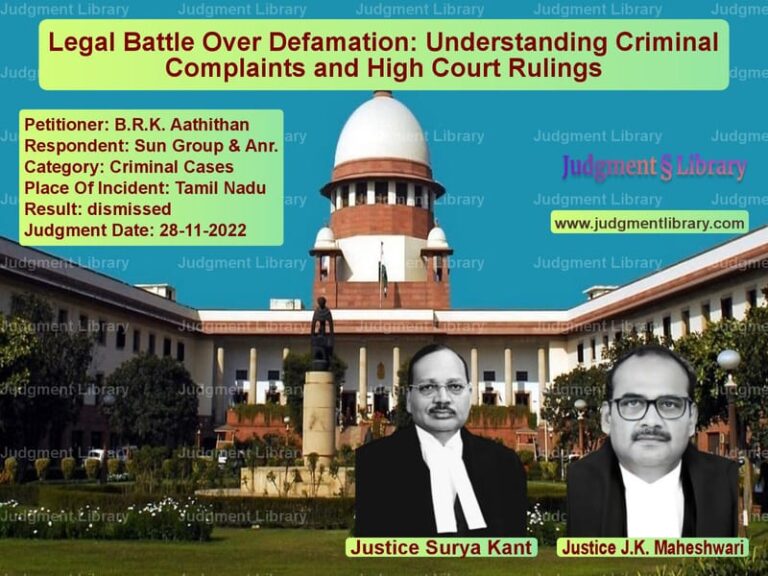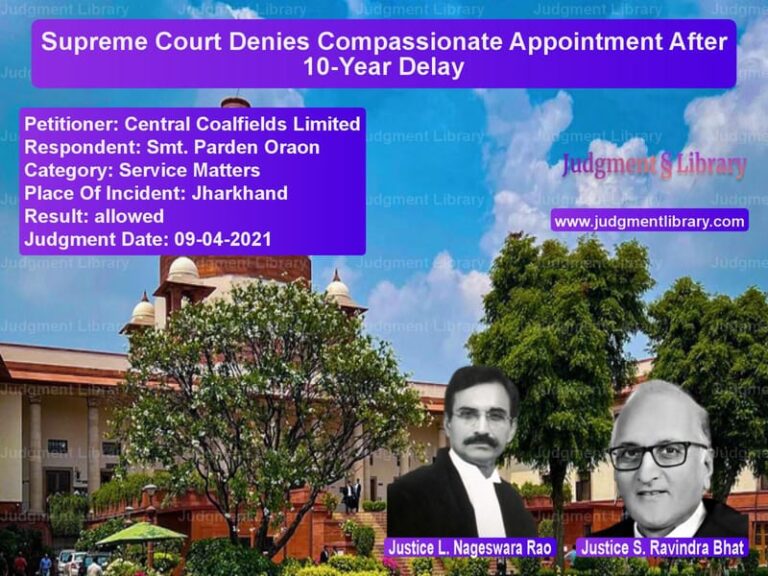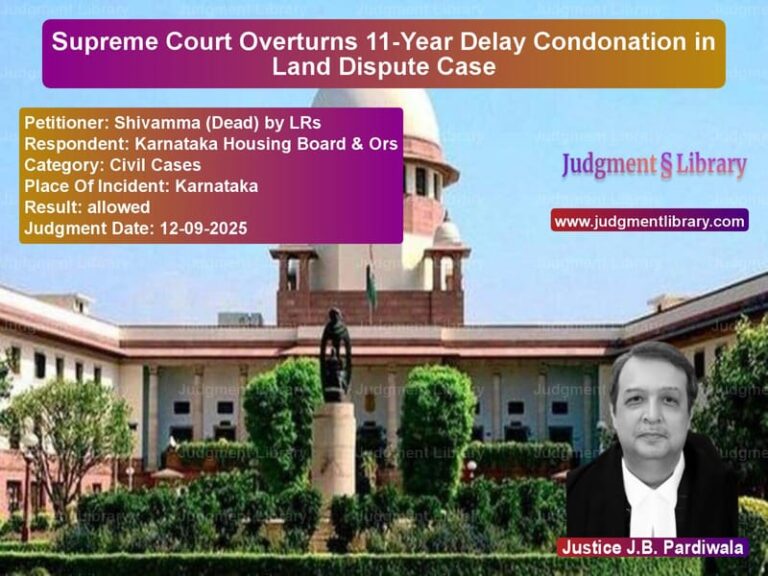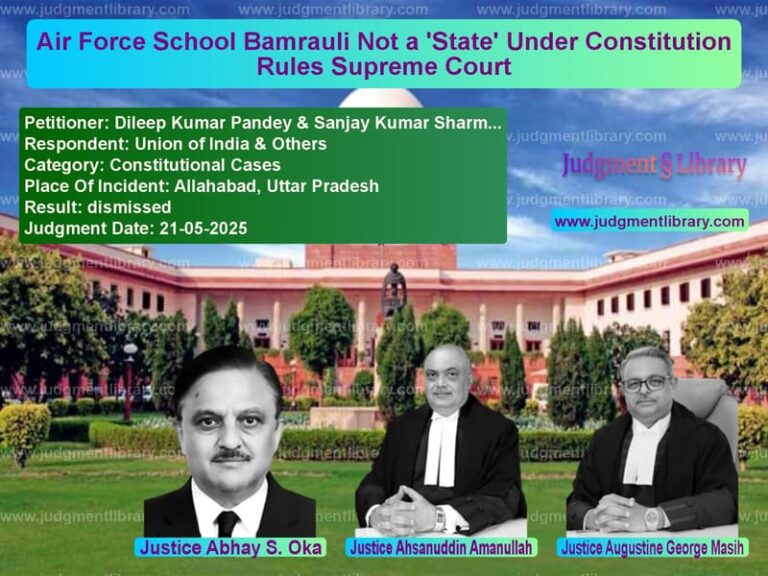Supreme Court Restores Family’s Joint Ownership in Disputed Rehabilitation Property
The Supreme Court of India recently overturned a Calcutta High Court ruling in a long-standing property dispute concerning land allotted under a government rehabilitation scheme. The case, Bina Basak & Others vs. Sri Bipul Kanti Basak & Others, dealt with a property dispute among family members who had migrated from East Pakistan (now Bangladesh) and received land under a rehabilitation program in Siliguri, West Bengal.
The Supreme Court ruled that the property was allotted for the benefit of the entire family, not just an individual, and rejected the attempt of one member to claim sole ownership. The decision underscores the principle that government rehabilitation schemes aim to benefit entire displaced families, not just individual applicants.
Background of the Case
The case involved the property rights of a family that migrated from East Pakistan in 1950 following the partition of India. The land in dispute was granted by the Relief and Rehabilitation Department of the Government of West Bengal to the family for resettlement.
The main issue arose when Smt. Hem Prova Basak, wife of the eldest brother, claimed exclusive ownership of the property, arguing that the lease was executed in her name. However, her two brothers-in-law, Bimal Kanti Basak and Benoy Krishna Basak, contended that the land was granted for the benefit of the entire family, and they had equal rights over it.
Legal Disputes and Court Proceedings
1. Initial Lease and Government Decisions
- The land was initially allotted in the name of Smt. Hem Prova Basak for the benefit of the entire family.
- Later, in response to representations from Bimal Kanti Basak and Benoy Krishna Basak, the government approved the inclusion of their names in the lease.
- On November 7, 1979, the Sub-Divisional Officer (SDO) ordered that their names be added to the lease, recognizing their rights as equal beneficiaries.
2. Legal Battle Over Ownership
- In 1983, Smt. Hem Prova Basak filed a civil suit seeking to restrain her brothers-in-law from claiming any rights in the property.
- The defendants filed a counterclaim asserting that the land was granted to the family as a unit and that the lease deed should reflect the names of all three brothers.
- The Trial Court dismissed the suit in 1999 and ruled in favor of joint ownership.
3. High Court Ruling in Favor of Sole Ownership
- Smt. Hem Prova Basak appealed to the Calcutta High Court, which ruled in her favor in 2013, reversing the lower court’s decision.
- The High Court held that since the lease deed was in her name, she was the sole legal owner.
4. Appeal to the Supreme Court
- The family members of the two younger brothers challenged the High Court’s decision in the Supreme Court of India.
- They argued that the property was meant for the entire family’s rehabilitation, not just one person.
- They also highlighted that the lease deed was later canceled, and fresh freehold title deeds were issued in favor of all family members.
Supreme Court’s Key Observations
1. Government Rehabilitation Aimed at Family, Not Individuals
“The very objective of rehabilitation programs is to ensure the welfare of the entire displaced family. Any attempt to claim individual ownership over such properties is contrary to the scheme’s purpose.”
2. Property Was Jointly Developed
“The construction of the house on the disputed land was funded collectively by all three brothers. Therefore, it cannot be claimed by just one person.”
3. Lease Cancellation and Freehold Titles
The Court noted that the government later canceled the initial lease deed in 1995 and issued fresh freehold title deeds in favor of all family members.
“The issuance of separate freehold title deeds confirms the fact that the property was never meant to be exclusively owned by one person.”
4. Malafide Intent Behind the Lawsuit
“The suit was filed with the malicious intent to usurp the property and deprive the other family members of their rightful share.”
Final Verdict
The Supreme Court set aside the High Court’s ruling and restored the Trial Court’s decision, upholding the rights of all family members to the property.
“The appeal is allowed. The orders of the High Court and First Appellate Court are set aside, and the decision of the Trial Court is restored.”
Conclusion
This landmark ruling upholds the principle that rehabilitation schemes are designed for entire families, not individuals. The key takeaways from the judgment are:
- Rehabilitation land belongs to the family unit – Individual members cannot claim exclusive ownership.
- Government policies must not be exploited – Beneficiaries cannot misuse welfare programs for personal gain.
- Legal recognition of family contributions – Courts will consider joint efforts in property development.
The judgment serves as a strong precedent for similar disputes, ensuring that government schemes achieve their intended purpose of family welfare.
Petitioner Name: Bina Basak & Others.Respondent Name: Sri Bipul Kanti Basak & Others.Judgment By: Justice Vikram Nath, Justice Satish Chandra Sharma.Place Of Incident: Siliguri, West Bengal.Judgment Date: 21-03-2024.
Don’t miss out on the full details! Download the complete judgment in PDF format below and gain valuable insights instantly!
Download Judgment: bina-basak-&-others-vs-sri-bipul-kanti-basa-supreme-court-of-india-judgment-dated-21-03-2024.pdf
Directly Download Judgment: Directly download this Judgment
See all petitions in Property Disputes
See all petitions in Succession and Wills
See all petitions in Judgment by Vikram Nath
See all petitions in Judgment by Satish Chandra Sharma
See all petitions in allowed
See all petitions in Quashed
See all petitions in supreme court of India judgments March 2024
See all petitions in 2024 judgments
See all posts in Civil Cases Category
See all allowed petitions in Civil Cases Category
See all Dismissed petitions in Civil Cases Category
See all partially allowed petitions in Civil Cases Category

